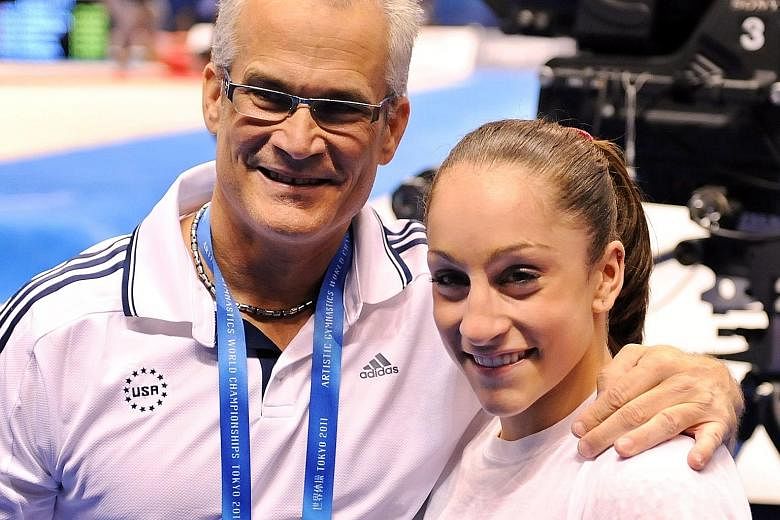NEW YORK • It has been a hard landing for gymnastics in the United States.
The horror stories surrounding Larry Nassar are stomach-churning and all the more tragic for how easily many of them could have been avoided.
For years, young women reported the abuse of Nassar - who rose to prominence while working with USA Gymnastics - to parents, police and school staff, only to have their reports ignored.
This has left many wondering: How does a parent - not just in the US but around the world - know when a trusted coach, trainer or doctor is behaving inappropriately with their child?
Gymnasts, in particular, become used to being touched, held, thrown, caught, bent and stretched by coaches at an early age, sometimes blurring the lines between "good touch" and "bad touch" for small children.
Given the competitive nature of parents involved in youth sports, a coach taking a special interest in a young athlete is as likely to be attributed to a child's superior athletic genes as grooming for sexual abuse.
But no matter how much talent, if a coach is taking a special interest in a child, parents must ask themselves why.
If a coach stresses the need to be alone with the child, in the gym or outside it, parents should see it as the inappropriate request that it is, rather than giving in to the flattery of a coach's attention.
Former Olympian Nancy Hogshead-Makar, now a civil rights lawyer and chief executive of legal advocacy group Champion Women, said it is crucial to begin talking to children about "good, ethical" coaches at an early age, with age-appropriate language.
"Parents have to teach kids that they have bodily autonomy, to know what's theirs, and to trust their inner gut. We don't want parents telling their kids to 'do whatever the coach says'," she added.
"Athletes have to be empowered to say no to coaches, doctors and trainers at an early age, or we're setting them up for failure. Athletes and coaches should not be in an authoritarian relationship."
Parents should tell their young children, for example, that a good, ethical coach will never need to be alone with the child.
"You will always be in an area that can be observed by other people," is something to say to your child.
Ms Hogshead-Makar said: "You can tell an eight-year old that a good, ethical coach will never text just you. He or she will never contact just you on social media.
"Everything should be in group texts or social media posts. A good, ethical coach will never give only you a gift. A good, ethical coach doesn't play favourites."
As children approach their teen years (10 to 12), parents can begin wading into a discussion of romantic and sexual relationships with coaches, telling them that this is a no-no regardless of age or consent, she added.
"We have rules about teachers, doctors and lawyers having relationships with their students, patients and clients," she said. And coaches need to be a part of that list.
The reasons for these rules, said Ms Hogshead-Makar, are numerous. First, young athletes must understand that coaches who enter into relationships with them abuse the position of power they hold over the athletes.
Further, watching older teammates enter into romantic relationships can skew the judgment of a young athlete. "When an 18-year-old is dating a coach, a 12-year-old getting kissed is lulled into the idea of true love," she noted.
A coach who takes a special interest in a young athlete also upsets the team dynamic. Athletes who are shown favouritism by their coach get more playing time, are introduced to more college coaches, and have numerous other opportunities not available to all team members.
In an era when athletes start training with club coaches and taking private lessons at younger and younger ages, Ms Hogshead-Makar said parents should strive to have their children in an authoritative relationship with their coach, which stresses teaching and guidance over an authoritarian relationship, where a coach exerts control through power and coercion.
And while the coach may be the expert in his chosen field, parents must feel free to disagree and give their input.
"If a parent doesn't feel like they can speak out, you'd better believe a kid doesn't believe they can speak out, either," warned Ms Hogshead-Makar.
WASHINGTON POST

